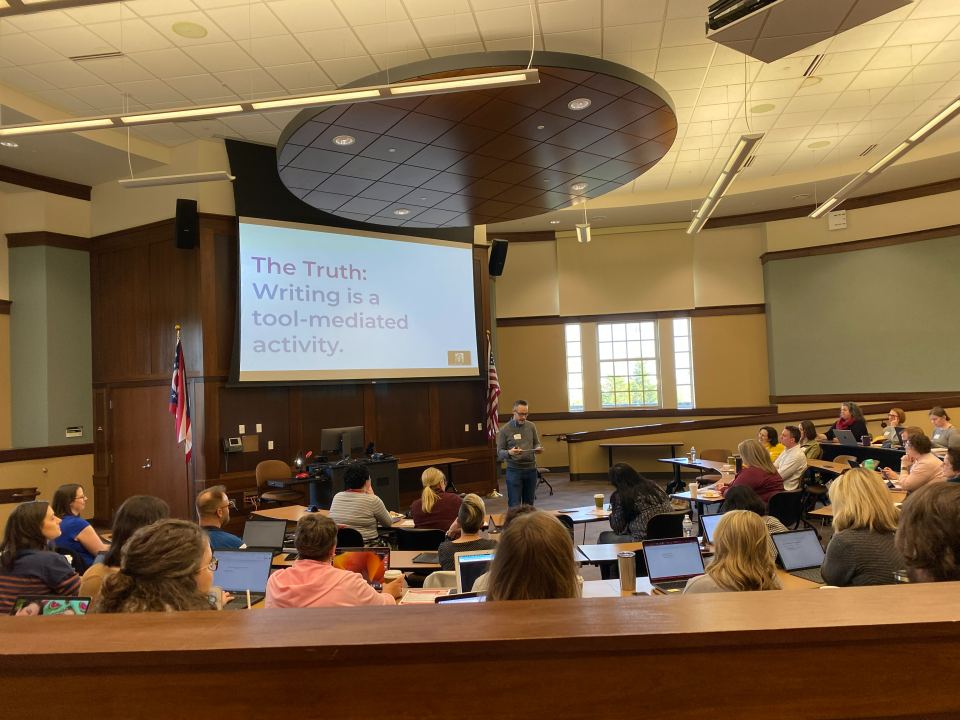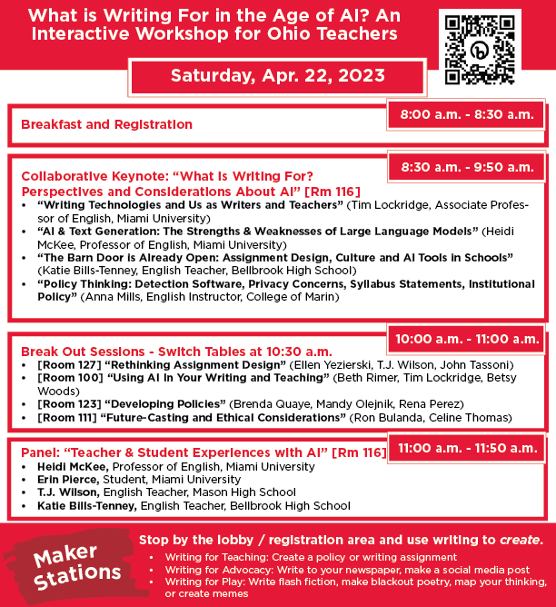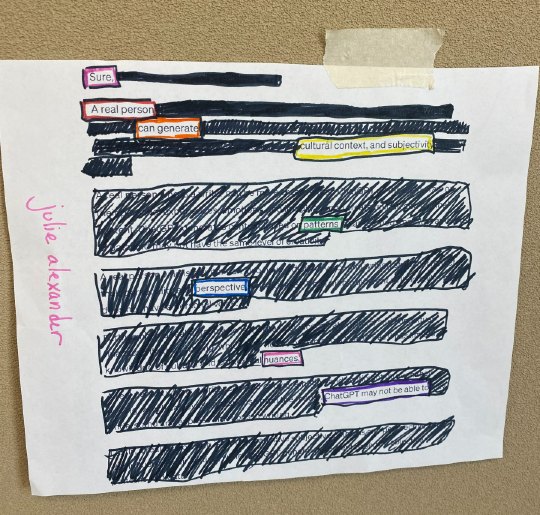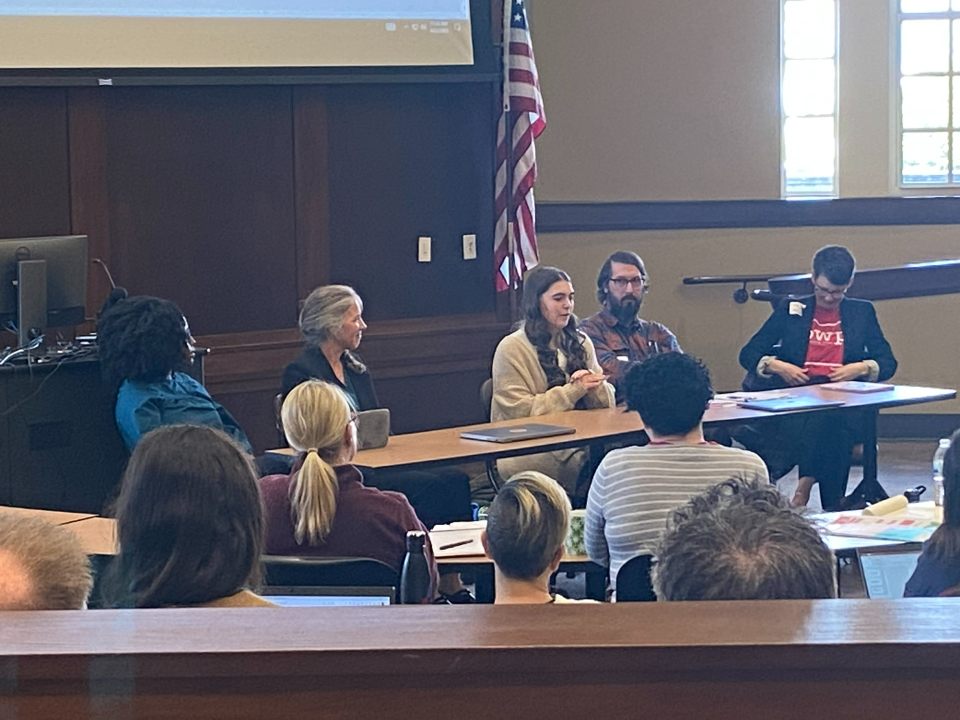HCWE Co-Sponsors Artificial Intelligence Conference for Ohio Educators
New forms of artificial intelligence (AI), such as ChatGPT, have caused quite the stir in education circles in recent months. The advances in large language models have led many educators at all levels to ask difficult questions about their curriculum design, instructional methods, and course assignments--particularly when it comes to the role of writing.
HCWE Co-Sponsors Artificial Intelligence Conference for Ohio Educators
 New forms of artificial intelligence (AI), such as ChatGPT, have caused quite the stir in education circles in recent months. The advances in large language models have led many educators at all levels to ask difficult questions about their curriculum design, instructional methods, and course assignments--particularly when it comes to the role of writing. The Howe Center for Writing Excellence (HCWE), the Ohio Writing Project (OWP), and the Ohio College Teaching Consortium (OCTC) recently co-sponsored a conference at Miami University’s Voice of America Learning Center to bring together K-16 educators from across the state to imagine what learning looks like in this new age of AI. OWP Co-Directors Beth Rimer and Jason Palmeri planned the conference along with HCWE Director/OCTC Planning Committee Chair Elizabeth Wardle.
New forms of artificial intelligence (AI), such as ChatGPT, have caused quite the stir in education circles in recent months. The advances in large language models have led many educators at all levels to ask difficult questions about their curriculum design, instructional methods, and course assignments--particularly when it comes to the role of writing. The Howe Center for Writing Excellence (HCWE), the Ohio Writing Project (OWP), and the Ohio College Teaching Consortium (OCTC) recently co-sponsored a conference at Miami University’s Voice of America Learning Center to bring together K-16 educators from across the state to imagine what learning looks like in this new age of AI. OWP Co-Directors Beth Rimer and Jason Palmeri planned the conference along with HCWE Director/OCTC Planning Committee Chair Elizabeth Wardle.

“What is Writing for in the Age of AI? An Interactive Working Day for Ohio Teachers,” brought together 79 educators from 39 different institutions across the state of Ohio; half the participants came from K-12 and half came from higher education. Participants came not only from Miami and the immediate area but also from Mason, Dayton, Bellbrook, Findlay, Toledo, Xenia, Cincinnati, and beyond. Attendees taught subjects as diverse as 8th grade language arts, college chemistry, biology, and composition, and culinary arts. The conference was split into three parts:
- A collaborative keynote featuring presenters from Miami University (Drs. Heidi McKee and Tim Lockridge), Bellbrook High School (Katie Bills-Tenney), and the College of Marin (CA) (Dr. Anna Mills)
- Breakout sessions where participants could delve into assignment design, policy design, future-casting/ethical questions, and using AI as writers and as teachers
- A collaborative panel of professors, high school teachers, and high school and college students who currently use AI.

Throughout the conference, attendees could drop by Maker Stations to write for teaching, advocacy, or play. Co-leader Beth Rimer read some AI blackout poetry from one of the Maker Stations to close out the day.

Dr. Mandy Olejnik, Assistant Director of Howe Writing Across the Curriculum, led a breakout session on policy and syllabus language along with Miami’s Asst. Director for Academic Integrity, Brenda Quay, and HCWE Graduate Assistant Director Rena Perez. Olejnik was inspired by the generative discussion. “We had a great group of educators from community colleges and high schools at our breakouts who wanted to talk about student engagement, and how ChatGPT and other AI tools can elicit student engagement,” she wrote. “We asked them to keep an open-mind around AI tools and not to outright decide to ban them, and then presented them with scenarios about how students may be using these tools in their work. They observed, listened, shared, discussed, and reflected very thoughtfully, and have me excited about the ways I can use ChatGPT in my own classroom.”

Another highlight for Olejnik was the discussion panel in which TJ Wilson, an English teacher at Mason High School, described how AI has challenged educators to get creative. Wilson “talked about the idea of ‘good theft’ vs. ‘bad theft’ in terms of creativity and inspiration, and mused how we can talk about this with our students,” Olejnik wrote. “I found that very insightful and thought-provoking.”
Dr. Elizabeth Wardle, Howe Center Director, found the discussions across K-16 and disciplinary divides to be generative: “We all learned a lot from each other and from the students who attended. We hope to sponsor more events, with our Ohio Writing Project colleagues, to bring these populations together.”
The resource folder used by the conference participants is available to anyone here: https://drive.google.com/drive/folders/1NSkNv3_nKXIkH7ceO0CtrJ1KmNnihFSH
The Howe Center for Writing Excellence hosted many workshops this semester dedicated to artificial intelligence and its impact on writing instruction, assignment design, and policy. Four working teams have been researching and creating resources for the Miami community, and will share what they learned in Fall 2023. Miami University faculty and graduate students interested in learning more can register for upcoming events by visiting the HCWE website.